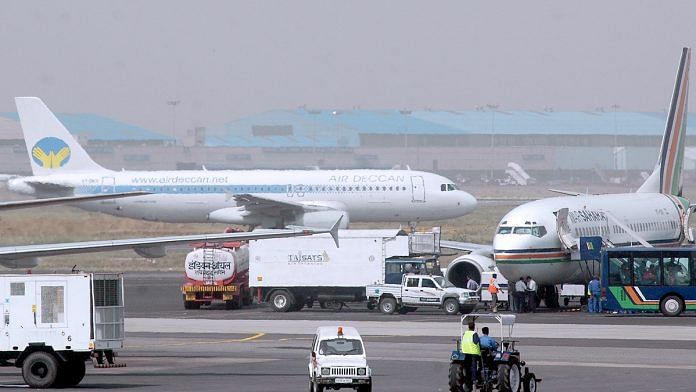New Delhi: Airline passengers having to raise their arms before physical frisking begins at airports will now be a thing of the past.
The Ministry of Civil Aviation has decided to install body scanners, in place of the door frame metal detectors (DFMDs), in all hypersensitive and sensitive airports across the country. The ministry has directed operators of all these airports to install the body scanners by March 2020.
The scanners will be installed at the pre-embarkation security checkpoints in a phased manner. Passengers will be required to just walk through them but will have to remove their shoes, belts, jackets and thick clothing, all of which will continue to be monitored by the current X-ray machines.
The system can detect metallic and non-metallic weapons and objects, standard and homemade explosives, improvised explosives devices and liquids, gels or any other items hidden under clothes and over the skin.
The ministry, in a circular issued recently, has said that the body scanners are being deployed to enhance security at airports across the country.
“Terrorist incidents have forced state authorities to take additional security measures to protect civil aviation from political terrorist attacks, including deploying of advanced technologies aimed at detecting threats of varying complexity,” reads the circular.
The circular adds that since the WTMD (walk-through metal detector) and the HHMDs (hand-held metal detector) cannot detect non-metallic weapons and explosives, the body scanners will plug this gap.
A source from the security department of the Airport Authority of India (AAI) told ThePrint that bullet-proof vehicles and bullet-proof vests will also be made available at airports soon.
The body scanner
The Bureau of Civil Aviation Security (BCAS) has already finalised the specifications of the body scanners, which will red flag any suspicious metallic and non-metallic items concealed on the body.
The scanners are based on millimetre wave technology comprising non-ionising electromagnetic radiation. They will be able to screen 300 passengers per hour and will be able to store images for a minimum of seven days.
The body scanner system will provide automatic detection of items over the skin with an image-free solution using a generic mannequin. Threats will be graphically presented on the generic mannequin so that security staff can tell the location of these objects for a targeted search.
Also read: Small airport privatisation gets on the fast lane after Modi govt relaxes rules
Safety aspects of the system
According to the BCAS, there will be no harmful radiation emitted by the body scanner system. In its circular, however, the ministry has told airport operators that the scanners should have a model specific valid certificate from either national or international accreditation laboratories, which will have to be provided by the original equipment manufacturer (OEM).
Each system will also have a radiation dosimeter to check for any harmful radiation being emitted by the system at any given time.
“Pregnant women will be subjected to the same screening procedures as other passengers,” said a source in the Airport Authority of India. “If a pregnant woman expresses concern, however, she may request a physical search in lieu of a search using detection systems such as HHMD, WTMD or body scanners. In such a case, private screening should be arranged.”
Body scanner protocol
The AAI has also drawn up an operating procedure for the body scanners. Given the radioactive nature of the device, it has called upon airport operators to maintain at least one set of DFMDs to screen passengers and airport personnel who have medical conditions.
Further, at least 10 per cent of the passengers cleared by the body scanner system will be randomly searched. The physical search will include a full pat down and will also be put to use if anyone refuses to go through the body scanner system.
Also read: Modi inaugurates Sikkim’s first airport, furthers BJP’s ‘look northeast’ policy



